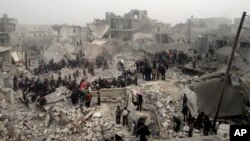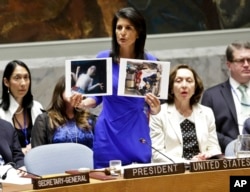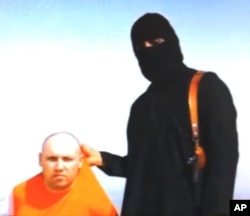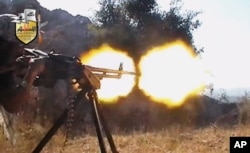Tuesday's alleged chemical attack in Khan Sheikhoun, Syria, which has left dozens dead, was the latest outrage in a conflict marked by human rights violations carried out on an industrial scale, rights activists say.
From the start, the conflict saw a disregard of the rules of war the world has tried to establish since World War II. The warning signs came quickly.
A series of massacres occurred in spring 2012 in three districts of Homs involving government soldiers and members of the notorious Shabiha militia, ultra-loyal enforcers of the regime drawn from President Bashar al-Assad's minority Alawite sect, an offshoot of Shi'ite Islam.
First came a siege, then homes were raided by assailants who raped and killed, according to locals interviewed by VOA shortly afterward and rights organizations. Dead bodies were burned, corpses were mutilated and rights activists documented the killing of at least 224 civilians, including 44 children and 48 women.
Months later, this correspondent interviewed Saima, a 38-year-old woman who had survived the massacre. Brandishing her scarred hand, she said she'd been shot in it, seen her husband's first wife slain by Shabiha and a neighbor raped. She and her three daughters escaped only because an Alawite militiaman took pity on them. Other girls weren't so lucky.
A mound of death
"They raped teenagers," Saima told me almost in a whisper, claiming that the day after the massacre she saw naked girls in a hospital piled up dead.
A 2015 report by the the U.N.'s Independent International Commission of Inquiry on the Syrian Arab Republic concluded the war had been "characterized by a complete lack of adherence to the norms of international law."
From medieval-style torture in jails and detention centers, to the imposition of "surrender or starve" sieges aimed at denying whole communities food and medical supplies, to indiscriminate artillery bombardments and airstrikes on towns and villages, including the dropping of earth-shaking barrel bombs on residential areas, to the release of sarin and chlorine gases, the war has plumbed the depths of depravity.
Since World War II, few conflicts have come close to matching what's been happening in Syria. Rights experts and historians mention the conflicts in Biafra, the Congo, the Balkans and the 1994 Rwanda genocide as competitors in infamy.
The list of authoritative reports into rights abuses and war crimes in Syria is long. They include a 2014 U.N. report; a 2015 independent report on the credibility of allegations about torture and executions in Syrian jails; and a 2013 U.N. report on allegations of the use of chemical weapons.
As early as 2013, then-U.N. human rights commissioner Navi Pillay warned that the scale of viciousness "almost defies belief." She accused Assad of being implicated in war crimes. Assad and his top officials have denied responsibility for rights violations.
In an interview with the BBC in 2015, Assad denied his forces dropped barrel bombs. "I know about the army. They use bullets, missiles and bombs. I haven't heard of the army using barrels, or maybe, cooking pots," he said.
Atrocities in plain sight
What makes the Syria conflict different from Biafra, the Balkans or Rwanda is that war crimes have been happening in plain sight for the world to witness in real time, thanks to the internet, social media, cellphones, satellite imagery and digital cameras, say analysts.
And some of the armed groups have been all too happy to brag about their barbarity — especially the Islamic State terror group, which has used videos of the beheadings of Western journalists and aid workers, the hurling of gay men off roofs, and the fatal burnings and stonings of foes to scare opponents and recruit foreign fighters.
For those looking at Syria's six-year conflict from the outside, the slaughter appears to have had little or no pattern. U.N. investigators monitoring human rights abuses have accused rebel militias as well as jihadists of grave crimes, too.
Rebel war crimes have included recruitment of child soldiers, shelling of civilian-populated areas and hostage-taking, as well as the slaughter of members of religious minorities. A May 2013 U.N. report confirmed that rebel groups had used sarin gas.
But U.N. panels have been adamant that despite the killings by IS, the Syrian government has been responsible for many more deaths.
In 2015, a survey by the Syrian Network for Human Rights, a nonprofit based in Britain whose reports are considered highly reliable, broke down the details of 56 major massacres displaying obvious sectarian or ethnic-cleansing traits since the start of the war. Of those, 49 were carried out by forces linked to the Syrian government, undermining the narrative crafted by the regime, which has depicted itself as a bulwark against extremism.
U.N. investigators have compiled a list of government officials they say have been implicated in war crimes, and they have called on the Security Council to refer human rights violations to the International Criminal Court at The Hague. A growing number of Western politicians have called also for an ICC referral, peaking in 2014 when 55,000 photos of detainees' bodies taken by a forensic photographer, code-named Caesar, who worked in Assad jails were published.
Veto from Russia, China
Syria isn't a signatory to the treaty that set up the ICC. The court would have legal authority to investigate and prosecute war crimes in Syria only if directed to do so by the Security Council, but in 2014 Russia and China vetoed a proposal to involve the ICC.
In December, the U.N. General Assembly voted to establish an independent panel to assist in the investigation of those responsible for war crimes in Syria. The resolution was approved by 105 member countries; 15 voted against the resolution's adoption, and there were 52 abstentions.
But a single prosecution mechanism still remains elusive for war crimes committed in Syria. An option Western diplomats have discussed is setting up a U.N. tribunal like those established for the Cambodia and Rwanda genocides, but few hold out hope that such a tribunal would escape a Russian veto.
In the meantime, individual European states, including France, Germany and Spain, have been exploring ways to prosecute war criminals when they can, if only piecemeal, and are conducting investigations. All states have universal jurisdiction rights when it comes to war crimes. In 2015, two rebels who fled to Sweden were sentenced for crimes they committed in Syria.
"Six harrowing years on, there's no excuse for allowing the horrific crimes under international law that are being committed in Syria to go unpunished," Amnesty International's Samah Hadid said last month. But it will likely be some time, if ever, before senior Syrian officials see the inside of a courtroom.







